Three WWII veterans flew on Saturday, June 17 North Country Honor Flight #47
These men are your neighbors. Read their military service biographies. (Please Share)
June 17, 2023 – Plattsburgh – Honor Flight Executive Director Barrie Finnegan stated, “Three WWII veterans flying today is incredible even by National Honor Flight standards. With the Greatest Generation shrinking rapidly, we are proud to Honor these and the rest of the Veterans from the Korean War, the Vietnam War, the Cold War, and Desert Storm.
Biographies compiled and read at the Send-Off Ceremony by Janet Duprey
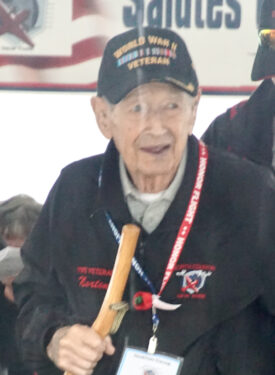 Norton Davis
Norton Davis
U.S. Navy 1944-1946 World War II
Norton, a senior in high school, turned 16 on Pearl Harbor Day. His parents refused to sign a waiver so they made a deal; if Norton went to college, he would go if called to serve.
Leaving Purdue, Norton, an electrical engineer, serviced new electronics. One radar device could tell if a plane was a friend or foe.
Norton joined the Signal Corp Engineering Lab when the Korean War broke out. A two-star General called, saying helicopter pilots were being shot down and they needed equipment to find them. The General ordered Norton to prepare equipment to ship in 6 months. A 2-year project, the General assured: “I have your back.” Norton had 600 pieces of equipment loaded on a ship to Korea in 6 months.
Norton’s father served in France in World War I. He taught Norton to realize what we have and who we are in America.
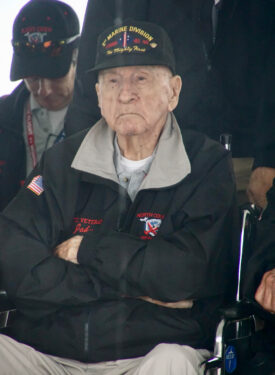 John Dooley
John Dooley
U.S. Marine Corps 1944-1947 World War II
John celebrated his 18th birthday as a member of the Marine Corps. John was an anti-aircraft gunner in the tub as the 3rd Division arrived at Iwo Jima. The 4th and 5th Divisions stayed at Iwo Jima as the 3rd went to Guam to prepare for the invasion of mainland Japan. After the bomb dropped, there was no invasion. John’s Division went to China to defend the American Embassy and help the Seabees rebuild it.
John was on the Great Wall of China when he realized the nationalist Chinese led by Chiang-Kai- Shek was on one side of the Wall and the communist Chinese led by Mao Tse Tsung were on the other. As a firefight ensued, John and his Gunner crawled under their vehicle. John said, “This stuff happens when boys get together.” The war, called ‘ battle fatigue, ‘ stayed on John’s mind for a long time.
John enjoyed an afternoon at his son’s house with Captain Dan Marshall, twice shot in Iwo Jima, lead intelligence officer of the 4th Marine Division.
Leaving, John reached the bottom porch step and saluted Captain Marshall, who did not return the salute. The Captain went down the steps, shook John’s hand, looked him in the eyes, and said, “John, the war is over.” Since that moment, John has been more relaxed, and battle fatigue is gone. On June 26th, John and his wife will celebrate their 75th wedding anniversary.
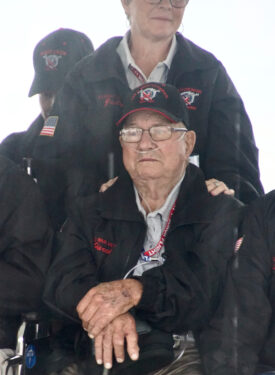 Harold Keysor
Harold Keysor
U.S. Navy 1956 – 1959 Vietnam
Naval Reserves 1959-1962
At 17, Harold enlisted in the Navy because he liked water. After basic training in Maryland, Harold completed his GED. Harold attended Class A Operator School, Mechanic and Supervisor schools.
Harold was stationed in Guam for 18 months as a Seabee, using his construction skills to support the Marines in building barracks and docks. Harold’s unit put in airstrips on small islands; some so small the islands’ airstrip went the entire length of the island.
Harold worked a lot, but most importantly, he learned a lot.
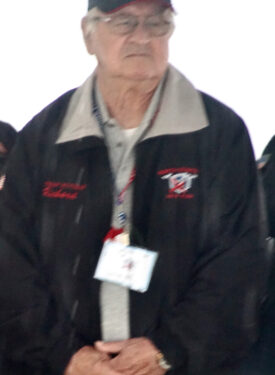 Richard Lamontagne
Richard Lamontagne
U.S. Air Force 1965-1988 Vietnam
After basic training, Richard was assigned as an Administrative Specialist ordered to Athens, Greece, a “choice location.” Richard worked in postal service mail terminals sorting and distributing, then put in charge of all Air Force mail. Next, Richard was assigned to the U.S. Embassy.
Returning stateside, Richard worked in training schools coordinating printing, testing, presentations, and more. Richard was ordered to Plattsburgh to work with the Commander of the Services Squad and then with the Colonel in charge of Base maintenance.
Richard would do it all over again.
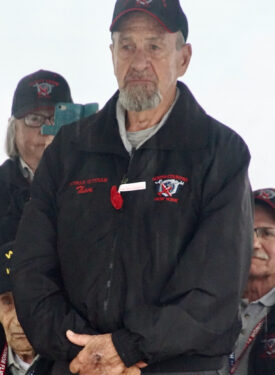 Gaylon LeCuyer
Gaylon LeCuyer
U.S. Navy 1983-1994 Desert Storm
Gaylon enlisted and completed basic training at Fort Knox.
At Fort Riley, Gaylon had cohesive training in a cohort going back and forth between Fort Riley and Germany for 18 months.
Deployed to Iraq, Gaylon’s division took part in the 4th Battalion, 37th Armor going through minefields to liberate Kuwait. A 17-year-old soldier asked Gaylon if he would bring him home; he said ‘yes’ and proudly brought all his platoon home.
Gaylon received 13 medals, including a Bronze Star and Meritorious Service Medal.
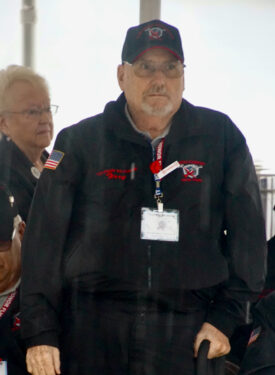 Terry Morris
Terry Morris
U.S. Air Force 1966-1986 Vietnam
Terry and some friends signed up at the Marine Corps recruiting office. The recruiter knew them and said, “Oh hell no.” Terry joined the Air Force.
Terry traveled to Japan, Germany, Thailand, England, Belgium, and eventually Vietnam at Monkey Mountain, near Da Nang.
Part of Terry‘s duties was to load the aircraft tip-tanks with Agent Orange and dispose of the empty drums. Of course, no one said anything about the dangers until after the War.
Terry retired from the 380th Bomber Wing, Plattsburgh Air Force Base.
Terry proudly says, “I’d do it all over again.”
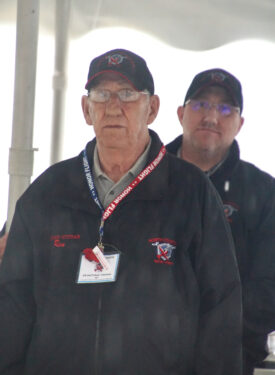 Ronald Packwood
Ronald Packwood
U.S. Air Force 1961-1988 Vietnam
Ronald completed basic training in Texas and began his career as a vehicle operator rising to Transportation Supervisor. Ron was stationed at Air Force Bases: Shreveport; Plattsburgh (where Ron met his wife); Puerto Rico; Keesler; Thailand; Chanute; and Germany. Ron’s final destination was the Air Force Academy overseeing vehicles on the bases where he was stationed.
After 27 years of service, Ron retired as a civilian Transportation Supervisor until the closure of Plattsburgh Air Force Base.
Ron is proud his four sons served in the Air Force; Ronald, Steve, Kenny, and Kevin.
 Kevin Packwood is a Veteran Guardian of his Dad
Kevin Packwood is a Veteran Guardian of his Dad
U.S. Air Force 1989-1998 Desert Storm
Kevin enlisted and was stationed at Plattsburgh Air Force Base until it closed in 1995. A member of the Base Security Forces, Kevin was one of the last to leave.
Kevin was stationed at F.E. Warren Air Force Base, Wyoming. Kevin spent a year in Korea providing flight line security.
Kevin was deployed to Iraq for the first wave of Desert Storm, setting up base security, weapon storage, and protecting aircraft areas.
Kevin enjoyed the comradery of their close-knit team, and he would do it all over again.
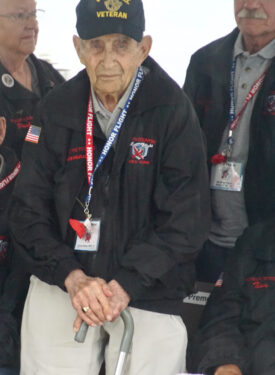 Armand Premo
Armand Premo
U.S. Army Air Corps 1943–1946 World War II
Armand joined the Army Air Corps the day after turning 18. Armand completed basic training at Lowry Field, Colorado. Flying in a C-119 cargo plane, Armand was listening to a headset. The pilot ascended 1,000 feet, saying, “I hope there’s no one up here as I can’t see a thing.”
Armand climbed the stairs to his assigned position on the Rock Hill Victory Ship with a bottle of whiskey in his fatigues belt. The bottle slipped; smashed on the deck; no one knew where it came from. Landing in France, the ship dropped anchor a mile offshore as they approached a minefield; they waited for a pilot boat to guide them to shore. That night going through the woods, Armand’s Commander was stabbed by a French soldier. Armand wondered if the French were allies or enemies.
In a B-25, Armand, a radio gunner, flew into Germany as the War was winding down. In Belgium, he learned the War was over.
Armand invited a friend to fly on a B-17 bomber. Coming to a ‘relief tube,’ the friend asked what it was. Armand’s humor he said, ‘It’s an intercom’; think about it!
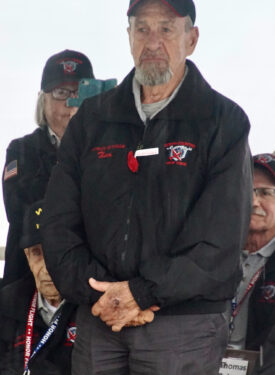 Philip Pearo
Philip Pearo
U.S. Army 1977-1987 Cold War
Vermont Army National Guard 1987-1990
Philip’s first flight was to Fort Dix for basic training, landing in a record snowfall. Fifty soldiers wide, up to their knees in snow, shoveled one shovel at a time to the soldier next to them.
Sent to Maryland, Phillip attended tank and diesel mechanic school. Trained on diesel trucks, generators, and jeeps, Philip moved on to engineering and master mechanic school and became an instructor on Cold Weather survival.
Returning home, Philip served 12 years with the Vermont Army National Guard.
Thomas Roberts
U.S. Army 1967-1970 Vietnam
Thomas and two high school friends completed basic training at Fort Dix. Tom went to Fort Gordon for Military Police training. Married with a 6-month-old baby, Tom was deployed to Vietnam, 9th Division for Base Security.
Tom had two close calls. A soldier sentenced to Leavenworth escaped; Tom found him; talked him out of shooting. A soldier who got a “Dear John” letter dropped a grenade in a bucket of ammo; 12 soldiers died.
Tom escorted dignitaries, including John Glenn and Bob Hope.
Honorably discharged, Tom was 21 when he returned home to his family.
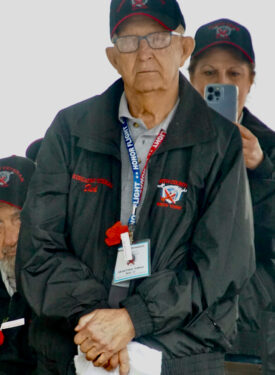 Richard Shinnock
Richard Shinnock
U. S. Air Force 1951-1955 Korean
As a Peace Soldier, Richard was sent to Japan after Pearl Harbor.
Soon after arriving in Japan, Richard bought a car, and he was in a minor fender bender. He asked those in the car that hit him if they were hurt. The gentleman riding in the backseat was Prime Minister to Emperor Hirohito. The Prime Minister was so impressed with Richard’s concern they sparked a friendship. Richard attended many functions and events hosted by the Prime Minister, who also presented Richard with gifts of thanks. As Richard’s tour ended, the Prime Minister offered his family a second home in Japan to visit any time.
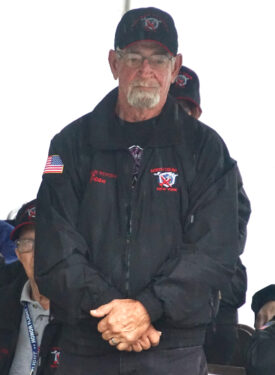 Jean St. Cyr
Jean St. Cyr
U.S. Army 1969-1972 Vietnam
At age 18, Jean attended basic and advanced infantry training at Fort Dix. Sent to Germany, Jean drove commercial trucks from Ports to Bases near the North Sea.
Jean re-enlisted and was ordered to Vietnam. Jean’s Division supported the 4th Infantry Division delivering supplies to bases near Pleiku. Jean’s transport was ambushed; sadly, Jean could not save the truck driver. In a second ambush, Jean was injured and flown by helicopter to a hospital. Jean was awarded two Purple Hearts.
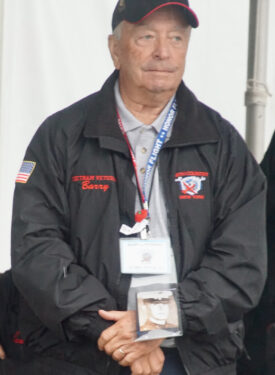 Barry Whitman
Barry Whitman
U.S. Army 1966-1972 Vietnam
After training at Fort Dix, and Fort Polk, Barry was assigned to the 25th Infantry Division, the Wolfhounds. In Vietnam, Barry was a Radio Operator for the Company Commander.
In battle, Barry was shot in the chest, missed his heart and hit his lung. Barry’s parents were advised he had a ‘minor injury.’ The local paper published it; a Watertown paper wrote his obituary, rescinded a few days later. Leaving the hospital, Barry was assigned to Headquarters Company. Barry is a Purple Heart Recipient.
At the Wall, Barry will pay respects to a childhood friend, Steven Vallier, the first Vietnam casualty from Tupper Lake.
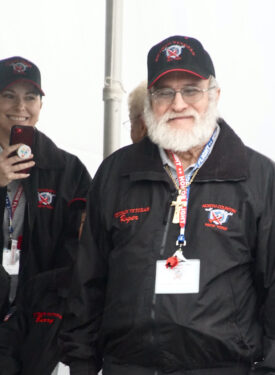 Roger Willingham
Roger Willingham
U.S. Army 1968-1972 Vietnam
Roger enlisted so he wouldn’t be drafted. After basic training, he went to advanced training at Fort Bennington.
Ordered to Vietnam, Roger joined the Army/Navy Division. Roger served in the 1098th Transportation Command attached to Headquarters Company.
As the radio operator for the Harbor Master’s office, Roger communicated with the ships entering and leaving the harbor.
Roger says the nights were the worst. On his radio, he heard companies on land under attack; brothers were in distress; Roger could not help; he listened. Roger said it was the hardest part.
Posted: June 19th, 2023 under Adirondack Region News, City News, Community Events, General News, National News, Northern NY News, Peru News, Peru resident news/accomplishments, Peru/Regional History, Upstate New York, Veterans' News.
